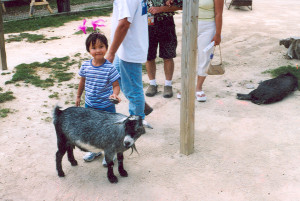The Tampa Tribune says that Old McMicky’s Farm, the original petting zoo that survived while surrounding acreage was grabbed for development, only to succumb to an E. coli scare and a decline in visitors, has been resurrected – by a homebuilder.
That E. coli scare was in 2005 and was quite real and sickened at least 78 people who petted farm animals at three fairs in Florida and apparently  scared everyone away.
scared everyone away.
The outbreak was traced back to infected sheep, goats and cows provided by Ag Venture Farm Shows of Plant City.
So countywide, parents stopped taking their kids to farms. PTAs canceled animal appearances at spring festivals. And the Hillsborough County School District imposed a moratorium on all field trips to petting zoos and farms.
Petting farms like Old McMicky’s — which typically served more than 32,000 Pasco, Hillsborough and Pinellas schoolchildren a year — lost so much business, they were in danger of going under. And some did.
At the time, Janice Rodda, president and program manager for Old McMicky’s Farm said, “We don’t know what to do. … We’ve been in business since 1991 without ever a sickness. I try to tell the parents: Do you avoid all restaurants if one restaurant has E. coli? Why are you canceling from us?”
Such a communication strategy was probably a contributing factor to declining attendance; instead of telling wary parents the staff at Old McMicky’s took a number of preventative steps and had a thorough understanding of zoonotic risk, Rodda went to the ole standby, we’ve done things this way forever and never had a problem.
Not good enough.
So when Ralph Zuckerman of Palm Harbor, Old McMicky’s new owner, says he’s not going to build houses on the land but recreate the petting zoo bit and  describes it as “old-fashioned, traditional fun in a beautiful natural setting,” I wonder if he has really assessed the risks.
describes it as “old-fashioned, traditional fun in a beautiful natural setting,” I wonder if he has really assessed the risks.
Zuckerman, owner of Avalon Building Corp., Tarpon Springs, bought the land in 2006 from the couple who had operated McMicky’s for 15 years.
One recent morning, 120 children, ages 5 and 6, from South Tampa’s Roosevelt Elementary School, their teachers and 60 parents arrived for the day’s first tour of the farm rebuilt “in the old Florida traditional style.”
“We’re very excited this has reopened,” said Roosevelt kindergarten teacher, Pam Militello. “I think it’s great, because it’s hands-on, they’re getting to actually experience touching the animals,” she said midway through the tour.
“A real important part of the farm,” Zuckerman said, is his 1,000 Kids program, which opens the farm to children with or health problems or other disabilities. “Bring them out for great day on the farm, on us, no charge,” he said. “They and their families can take a break from whatever they’re going through and create some fun times and great memories.”
A table of petting zoo related outbreaks is available at http://bites.ksu.edu/petting-zoos-outbreaks.
 Unless you get Cryptosproidium.
Unless you get Cryptosproidium.







.jpg) inside cabinets and other equipment throughout the restaurant at 1177 Park Ave.
inside cabinets and other equipment throughout the restaurant at 1177 Park Ave. fines or even be forced to shut down.
fines or even be forced to shut down.  machine and 33 inside the ICEE beverage machine.
machine and 33 inside the ICEE beverage machine.